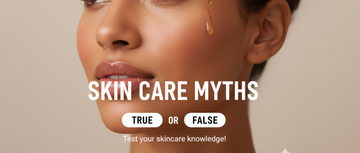Introduction: Why the Skin Barrier Matters
Have you ever felt like your skin stays dry no matter how much moisturizer you use? Or maybe your face turns red and stings when you apply even a simple product? Chances are, your skin barrier is damaged.
Your skin barrier is like your body’s natural shield. It locks moisture in and keeps irritants, bacteria, and pollution out. When it’s healthy, your skin looks soft, plump, and radiant. When it’s weak, you’ll notice dryness, sensitivity, and breakouts.
Understanding and repairing your barrier is one of the most important steps in long-term skincare health.
What Causes a Damaged Skin Barrier?
A compromised barrier can happen to anyone, and in Pakistan’s climate it’s even more common. Some leading causes include:
-
Over-exfoliation: Using too many acids or scrubs.
-
Harsh cleansers: Products that strip natural oils.
-
Environmental stress: Heat, UV rays, and pollution in cities like Karachi and Lahore.
-
Lifestyle factors: Stress, lack of sleep, and poor diet.
-
Improper layering: Combining too many actives (e.g., retinol + strong vitamin C at the same time).
Signs Your Skin Barrier is Damaged
How do you know if your barrier needs repair? Watch for these common signs:
-
Persistent dryness or tightness.
-
Flaking or rough texture.
-
Sensitivity, redness, or burning with products.
-
Breakouts that appear out of nowhere.
-
Dull, tired-looking skin.
If you check more than two of these boxes, your barrier likely needs attention.
How to Repair and Strengthen Your Skin Barrier
1. Simplify Your Routine
Cut back on exfoliants and strong actives. Stick to hydration + barrier-friendly ingredients for at least 2–3 weeks.
2. Choose Hydrating Toners
Look for toners with humectants like hyaluronic acid or coconut milk extract. These help draw water into the skin and relieve that tight feeling.
Example: A formula like Wave Toner combines coconut milk and niacinamide to prep the skin with lightweight hydration.
3. Add a Barrier-Repair Serum
Serums with niacinamide, hyaluronic acid, vitamin B5, and grape extract are excellent for barrier repair. They plump, soothe, and strengthen the outer layer.
Example: PULP Hydrating Barrier Serum combines all four, making it a strong choice for dry and sensitive skin.
4. Use a Mist for On-the-Go Hydration
Daily exposure to air conditioning or pollution can dry skin further. A refreshing mist with pomegranate and niacinamide can calm irritation anytime during the day.
💡 Example: PLUSH Mist works well to refresh and hydrate without disturbing makeup.
5. Seal with Sunscreen
Even if your barrier is recovering, UV exposure will undo progress. Always wear a broad-spectrum SPF 50+ to protect against sun damage.
💡 Example: PACT Sunscreen Serum SPF 60 provides lightweight daily protection without leaving a white cast.
🌤 Skin Barrier Care Tips for Pakistan
-
In summer, use light serums and SPF to protect against humidity and UV.
-
In winter, layer hydrating products and mists to fight dryness.
-
For city pollution, add antioxidant-rich fruit extracts (grape, blueberry) to strengthen defense.
⚠️ Mistakes to Avoid During Barrier Repair
-
Don’t layer too many new products at once keep it simple.
-
Avoid daily scrubs and high-percentage acids until your skin stabilizes.
-
Be patient repairing a barrier can take 3–6 weeks of consistency.
✨ Conclusion: Your Barrier, Your Glow
A strong skin barrier is the foundation of healthy skin. Without it, no amount of actives or makeup will give you the glow you want. By focusing on hydration, antioxidants, and gentle care, you can restore balance and resilience.
If you’re exploring barrier-focused products, look for ingredients like niacinamide, hyaluronic acid, vitamin B5, and fruit extracts. Brands such as QIARE are bringing these combinations into lightweight serums, toners, and mists tailored to modern skin needs in Pakistan.




